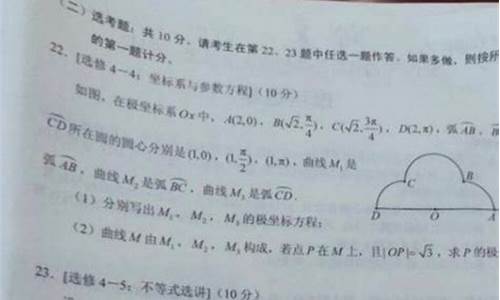您现在的位置是: 首页 > 热门专业 热门专业
2017高考英语陕西真题,2017陕西高考理科英语
tamoadmin 2024-06-15 人已围观
简介1.河北英语高考题2017年2.2017年高考英语词汇详解:persuade陷阱题解析3.高考领航2017英语答案大全4.成人高考高升专《英语》真题专项练习(一)?5.英语2017高考调研答案试卷满分:150分第一部分 听力(共两节,满分30分)第一节(共5小题;每小题1.5分,满分7.5分)第二节(共15小题;每小题1.5分,满分22.5分)第二部分 阅读理解(共两节,满分40分)第一节 (共
1.河北英语高考题2017年
2.2017年高考英语词汇详解:persuade陷阱题解析
3.高考领航2017英语答案大全
4.成人高考高升专《英语》真题专项练习(一)?
5.英语2017高考调研答案

试卷满分:150分
第一部分 听力(共两节,满分30分)
第一节(共5小题;每小题1.5分,满分7.5分)
第二节(共15小题;每小题1.5分,满分22.5分)
第二部分 阅读理解(共两节,满分40分)
第一节 (共15小题;每小题2分,满分30分)
阅读下列短文,从每题所给的A、B、C和D四个选项中,选出最佳选项,并在答题卡上将该项涂黑。
第二节 (共5小题;每小题2分,满分10分)
根据短文内容,从短文后的选项中选出能填入空白处的最佳选项。选项中有两项为多余选项。
第三部分 语言知识运用(共两节,满分45分)
第一节 完形填空(共20小题;每小题1.5分,满分30分)
阅读下面的短文,从短文后各题所给的A、B、C和D四个选项中,选出可以填入空白处的最佳选项,并在答题卡上将该项涂黑。
第二节 (共10小题;每小题1.5分,满分15分)
阅读下面短文,在空白处填入 1个适当的单词或括号内单词的正确形式。
第四部分 写作(共两节,满分35分)
第一节 短文改错(共10小题;每小题l分,满分10分)
第二节 书面表达(满分25分)
希望对你有帮助!
河北英语高考题2017年
2017高考英语阅读理解训练附答案
2017高考英语改革后实行一年两考,可多次参加,我认为对自己有信心的.同学可以早点参加,取得理想的成绩后就可以把学习重心放到其他科目上。为了帮助大家备考,我整理了一些高考英语阅读理解,希望能帮到大家!
history
If we were asked exactly what we were doing a year ago,we should probably have to say that we could not remember But if we had kept a book and had written in it an account of what we did each day,we should be able to give an answer to the question.
It is the same in history Many things have been forgotten because we do not have any written account of them Sometimes men did keep a record of the most important happenings in their country,but often it was destroyed by fire or in a war.Sometimes there was never any written record at all because the people of that time and place did not know how to Write.For example,we know a good deal about the people who lived in China 4,000 years ago, because they could write and leave written records for those who lived after them.But we know almost nothing about the people who lived even 200 years ago in central Africa. because they had not learned to write. Sometimes.of course,even if the people cannot write,they may know something of the past.They have heard about it from older people,and often songs and dances and stories have been made about the most important happenings,and these have been sung and acted and told for many generations For most people are proud to tell what their fathers did in the past.This we may call ?remembered history?.Some of it has now been written down. It is not so exact or so valuable to us as written history is,because words are much more easily changed when used again and again in speech than when copied in writing.But where there are no written records,such spoken stories are often very helpful.
41. Which of the following ideas is not suggested in the passage?
A.?Remembered history?,compared with written history,is less reliable
B.Written records of the past play the most important role in our learning of the human history.
C.A written account of our daily activities helps US to be able to answer many questions.
D.Where there are no written records.there is no history.
42.We know very little about the central Africa 200 years ago because
A.there was nothing worth being written down at that time
B .the people there ignored the importance of keeping a record
C.the written records were perhaps destroyed by a fire
D.the people there did not know how to write
43.?Remembered history?refers to
A.history based on a person?s imagination
B .stories of important happenings passed down from mouth to mouth
C .songs and dances about the most important events
D .both B and C
44.?Remembered history?is regarded as valuable only when
A. it is written down
B .no written account is available
C.it proves to be time
D.people are interested in it
45 .The passage suggests that we could have learned much more about our past than we do now if the ancient people had
A.kept a written record of every past event
B. not burnt their written records in wars
C.told exact stories of the most important happenings
D.made more songs and dances
答案:DDDBA
land produces
Although the United States covers so much land and the land produces far more food than the present population needs,its people are by now almost entirely an urban society Less than a tenth of the people are engaged in agriculture and forestry(林业),and most of the rest live in or around towns,small and large.Here the traditional picture is changing:every small town may still be very like other small towns,and the typical small town may represent a widely accepted view of the country,but most Americans do not live in small towns any more.Half the population now lives in some thirty metropolitan areas(1arge cities with their suburbs、of more than a million people each?a larger proportion than in Germany or England,let alone France.The statistics(统计)of urban and rural population should be treated with caution because so many people who live in areas classified as rural travel by car to work in a nearby town each day.As the rush to live out of town continues.rural areas within reach of towns are gradually filled with houses,so that it is hard to say at what moment a piece of country becomes a suburb But more and more the typical American lives in a metropolitan rather than a small town environment.
36.If now America has 250 million people.how many of them are engaged in agriculture and forestry?
A.About 25 million.
B.More than 25 million.
C.Less than 25 million.
D. Less than 225 million
37.Which of the following four countries has the smallest proportion of people living in metropolitan areas?
A.United States.
B.Germany.
C.France.
D.England.
38.What?s the meaning of the word?metropolitan?in the middle of the passage?
A .Of a large city with its suburbs.
B.Of small and large towns.
C.Of urban areas.
D.Of rural areas.
39.According to the passage,what can we learn about small towns in the United States?
A Most small towns become gradually crowded
B.Small towns are still similar to each other.
C.As the traditional picture is changing,towns are different.
D .Small towns are turning into large cities
40.Why is it hard to say when a piece of country becomes a suburb?
A.Because they are the same.
B.Because the rush takes place too quickly
C.Because the process is gradual.
D.Because more and more Americans live in metropolitan
答案:CCABC
president
There are stories about two U.S . presidents,Andrew Jackson and Martin Van Buren,which attempt to explain the American English term OK.We don?t know if either story is true,but they are both interesting. The first explanation is based on the fact that President Jackson had very little education.In fact,he had difficulty reading and writing.When important papers came to Jackson,he tried to read them and then had his assistants explain what they said.If he approved of a paper.he would write?all correct?on it.The problem was that he didn?t know how to spell.So what he really wrote was?ol korekt?.After a while,he shortened that term to?OK?.
The second explanation is based on the place where President Van Buren was born,Kinderhook,New York.Van Bnren?s friends organized a club to help him become President They caned the club the Old Kinderhook Club,and anyone who supported Van Buren was called?OK?.
31.The author
A. believes both of the stories
B.doesn?t believe a word of the stories
C is not sure whether the stories are true
D. is telling the stories just for fun
32. According to the passage,President Jackson
A.couldn?t draw up any documents at all
B. didn?t like to read important papers by himself
C.often had his assistants sign documents for him
D .wasn?t good at reading,writing or spelling
33.According to the first story, the term ?OK?
A. was approved of by President Jackson
B.was the title of some Official documents
C.was first used by President Jackson
D.was an old way to spell?all correct?
34 .According to the second story,the term?OK?
A.was the short way to say?old Kinderhook Club?
B.meant the place where President Van Buren was born
C.was the name of Van Buren?s club
D.was used to call Van Buren?s supporters in the election
35.According to the second story.the term?OK?was first used
A.by Van Buren
B.in a presidential election
C.to organize the Old Kinderhook Club
D.by the members of the?Old Kinderhook Club?
答案:CDCDB
;2017年高考英语词汇详解:persuade陷阱题解析
许多在眼前看来天大的事,都不是人生一战,而只是人生一站。确实高考备战让你们很辛苦,可是已经坚持了这么久,这就已经是胜利。祝高考成功!下面是我为大家推荐的河北英语高考题2017年,仅供大家参考!
河北英语高考题2017年第I卷
注意事项:
1.答第I卷前,考生务必将自己的姓名、准考证号填写在答题卡上
2.选出每小题答案后,用2B铅笔把答题卡上对应题目的答案标号涂黑。如需改动,用橡皮擦干净后,再选涂其他答案标号。不能答在本试卷上,否则无效
第一部分听力(共两节,满分30分)
做题时,先将答案标在试卷上,录音内容结束后,你将有两分钟的时间将试卷上的答案转涂到答题卡上
第一节(共5小题;每小题1.5分,满分7.5分)
听下面5段对话。每段对话后有一个小题,从题中所给的A、B、C三个选项中选出最佳选项,并标在试卷的相应位置。听完每段对话后,你都有10秒钟的时间来回答有关小题和阅读下一小题题。每段对话仅读一遍。
例:How much is the shirt?
A.£19.15. B.£9.18. C.£9.15.
答案是C。
1. Where is Mary?
A. In the classroom. B. In the library. C. On the playground.
2. How much should the man pay for the tickets?
A. $16. B. $12. C. $6
3. Why can?t the woman give the man some help?
A. She is quite busy now.
B. She doesn?t like grammar.
C. She is poor in grammar,too.
4. What happened to Marx?
A. He lost his way.
B. He found his bike missing.
C. He lost his wallet.
5. Why did the man fail to attend the party?
A. He forgot it.
B. He didn?t know about the party.
C. He wasn?t invited to the party.
第二节(共15小题;每小题1.5分,满分22.5分)
听下面5段对话或独白。每段对话或独白后有几个小题,从题中所给的A、B、C三个选项中选出最佳选项,并标在试卷的相应位置。听每段对话或独白前,你将有时间阅读各个小题,每小题5秒钟;听完后,各小题将给出5秒钟的作答时间。每段对话或独白读两遍。
听第6段材料,回答第6、7题。
6. Why must the man drive to work?
A. It is the quickest way.
B. He has to use his car after work.
C. He lives too far from the subway.
7. What?s the relationship between the speakers?
A. Boss and employee.
B. Grandmother and grandson.
C. Teacher and student.
听第7段材料,回答第8~9题。
8. When is Alice?s birthday?
A. Tomorrow. B. The day after tomorrow. C. Today.
9. What will the two speakers buy for Alice?
A. A recorder. B. Some flowers. C. A box of chocolates.
听第8段材料,回答第10~12题。
10. What does the woman do in the group?
A. Play the piano. B. Play the violin. C. Sing for the group.
11. Who is Miss Pearson?
A. Leader of the group.B. Director of the group. C. Teacher of the group.
12. How often does the group meet?
A. Once a week. B. Twice a week. C. Every third week.
听第9段材料,回答第13~16题。
13. Who possibly is the woman?
A. An air hostess. B. A native Indian. C. A travel agent.
14. How long does the trip last?
A. Seven days. B. Eight days. C. Nine days.
15. What will the man probably do at the second stage?
A. Do some shopping. B. Visit the Taj Mabal. C. See wild animals.
16. What will the speakers do next?
A. Say goodbye to each other.B. Find out the price. C. Go to India by air.
听第10段材料,回答第17~20题。
17. In what way does Jack like to travel?
A. With a lot of people.
B. With one or two good friends.
C. All by himself.
18. What does Helen prefer on holiday?
A. Staying at home.
B. Seeing famous places.
C. Enjoying nature quietly.
19. What does Bob like the best about travel?
A. Making more friends. B. Buying what he wants. C. Seeing and learning.
20. Who prefers to do shopping while traveling?
A. Jack. B. Helen. C. Bob.
第二部分阅读理解(共两节,满分40分)
第一节(共15小题;每小题2分,满分30分)
阅读下列短文,从每题所给的四个选项(A、B、C和D)中,选出最佳选项,并在答题卡上将该项涂黑。
A
We have designed all our bank cards to make your life easier.
Using your NatWest Service Card
As a Switch card, it lets you pay for all sorts of goods and services, whenever you see the Switch logo. The money comes straight out of your account, so you can spend as much as you like as long as you have enough money (or an agreed overdraft (透支) to cover it). It is also a cheque guarantee card for up to the amount shown on the card. And it gives you free access to your money from over 31,000 cash machines across the UK.
Using your NatWest Cash Card
You can use your Cash Card as a Solo card to pay for goods and services wherever you see the Solo logo. It can also give you access to your account and your cash from over 31,000 cash machines nationwide. You can spend or withdraw what you have in your account, or as much as your agreed overdraft limit.
Using your cards abroad
You can also use your Service Card and Cash Card when you?re abroad. You can withdraw cash at cash machines and pay for goods and services wherever you see the Cirrus or Maestro logo displayed.
We take a commission charge (手续费) of 2.25% of each cash withdrawal you make (up to£4) and a commission charge of 75 pence every time you use Maestro to pay for goods or services. We also apply a foreign-exchange transaction fee of 2.65%.
Using your NatWest Credit Card
With your credit card you can do the following:
* Pay for goods and services and enjoy up to 56 days? interest-free credit.
* Pay in over 24 million shops worldwide that display the MasterCard or Visa logos.
* Collect one AIR MILE for every£20 of spending that appears on your statement (结算单). (This does not include foreign currency or traveler?s cheques bought, interest and other charges.)
21. If you carry the Service Card or the Cash Card, ________.
A. you can use it to guarantee things as you wish
B. you can draw your money from cash machines conveniently
C. you can spend as much money as you like without a limit
D. you have to pay some extra money when you pay for services in the UK
22. If you withdraw£200 from a cash machine abroad, you will be charged ________.
A. £4 B. £4.5 C. £5.25 D. £5.3
23. Which of the following is TRUE about using your NatWest Credit Card?
A. You have to pay back with interest within 56 days.
B. You can use the card in any shop across the world.
C. You will be charged some interest beyond two months.
D. You will gain one air mile if you spend £20 on traveller?s cheques.
24. The purpose of the passage is to show you how to ________.
A. pay for goods with your cards B. use your cards abroad
C. draw cash with your cards D. play your cards right
B
Once when I was facing a decision that involved high risk, I went to a friend. He looked at me for a moment, and then wrote a sentence containing the best advice I?ve ever had: Be bold and brave ? and mighty (强大的) forces will come to your aid.
Those words made me see clearly that when I had fallen short in the past, it was seldom because I had tried and failed. It was usually because I had let fear of failure stop me from trying at all. On the other hand, whenever I had plunged into deep water, forced by courage or circumstance, I had always been able to swim until I got my feet on the ground again.
Boldness means a decision to bite off more than you can eat. And there is nothing mysterious about the mighty forces. They are potential powers we possess: energy, skill, sound judgment, creative ideas ? even physical strength greater than most of us realize.
Admittedly, those mighty forces are spiritual ones. But they are more important than physical ones. A college classmate of mine, Tim, was an excellent football player, even though he weighed much less than the average player. ?In one game I suddenly found myself confronting a huge player, who had nothing but me between him and our goal line,? said Tim. ?I was so frightened that I closed my eyes and desperately threw myself at that guy like a bullet ? and stopped him cold.?
Boldness ? a willingness to extend yourself to the extreme?is not one that can be acquired overnight. But it can be taught to children and developed in adults. Confidence builds up. Surely, there will be setbacks (挫折) and disappointments in life; boldness in itself is no guarantee of success. But the person who tries to do something and fails is a lot better off than the person who tries to do nothing and succeeds.
So, always try to live a little bit beyond your abilities?and you?ll find your abilities are greater than you ever dreamed.
25. Why was the author sometimes unable to reach his goal in the past?
A. He faced huge risks. B. He lacked mighty forces.
C. Fear prevented him from trying. D. Failure blocked his way to success.
26. What is the implied meaning of the underlined part?
A. Swallow more than you can digest. B. Act slightly above your abilities.
C. Develop more mysterious powers. D. Learn to make creative decisions.
27. What can be learned from Paragraph 5?
A. Confidence grows more rapidly in adults. B. Trying without success is meaningless.
C. Repeated failure creates a better life. D. Boldness can be gained little by little.
C
The wallet is heading for extinction. As a day-to-day essential, it will die off with the generation who read print newspapers. The kind of shopping-where you hand over notes and count out change in return?now happens only in the most minor of our retail encounters,like buying a bar of chocolate or a pint of milk from a corner shop. At the shops where you spend any real money, that money is increasingly abstracted. And this is more and more true, the higher up the scale you go. At the most cutting-edge retail stores?Victoria Beckham on Dover Street, for instance?you don't go and stand at any kind of cash register when you decide to pay. The staff are equipped with iPads to take your payment while you relax on a sofa.
Which is nothing more or less than excellent service, if you have the money. But across society, the abstraction(抽象) of the idea of cash makes me uneasy. Maybe I'm just old-fashioned. But earning money isn't quick or easy for most of us. Isn't it a bit incredible that spending it should happen in half a blink(眨眼)of an eye? Doesn't a wallet?that time-honoured Friday-night feeling of pleasing, promising fatness?represent something that matters?
But I'll leave the economics to the experts. What bothers me about the death of the wallet is the change it represents in our physical environment. Everything about the look and feel of a wallet?the way the fastenings and materials wear and tear and loosen with age, the plastic and paper and gold and silver, and handwritten phone numbers and printed cinema tickets?is the very opposite of what our world is becoming. The opposite of a wallet is a smartphone or an iPad. The rounded edges, cool glass, smooth and unknowable as pebble(鹅卵石). Instead of digging through pieces of paper and peering into corners, we move our fingers left and right. No more counting out coins. Show your wallet, if you still have one. It may not be here much longer.
28. What is happening to the wallet?
A. It is disappearing. B. It is being fattened.
C. It is becoming costly. D. It is changing in style.
29. What makes the author feel uncomfortable nowadays?
A. Saving money is becoming a thing of the past.
B. The pleasing Friday-night feeling is fading.
C. Earning money is getting more difficult.
D. Spending money is so fast and easy.
30. Why does the author choose to write about what's happening to the wallet?
A. It represents a change in the modern world.
B. It has something to do with everybody's life.
C. It marks the end of a time-honoured tradition.
D. It is the concern of contemporary economists.
31. What can we infer from the passage about the author?
A. He is resistant to social changes.
B. He is against technological progress.
C. He feels reluctant to part with the traditional wallet.
D. He feels insecure in the ever-changing modern world.
高考领航2017英语答案大全
高考英语词汇详解:persuade陷阱题解析
persuade是“说服”还是“设法说服”呢?请看题:
I _____ him not to go abroad, but he wouldn’t listen.
A. persuaded B. tried to persuade
C. have persuaded D. was persuaded
陷阱 容易误选A。
分析 正确答案为B。persuade 的真正意思是“说服”,而不是“设法说服”,要表示后者的意思英语应用 try to persuade 。如:
Who persuaded you to join the club? 谁劝说好你参加这个俱乐部的?
The salesman persuaded us to buy his product. 推销员劝说好我们购买他的产品。
I couldn’t persuade him to change his mind. 我没法劝说他改变主意。
The salesman persuaded us to buy his product. 推销员说服我们买了他的产品。
Who persuaded you to join the society? 谁劝说你参加这个协会的?
Try as I would, I could not persuade him to give up the idea. 尽管我努力这样做,我却没能劝说他放弃这个想法。
He tried to persuade him to change his mind. 他设法劝说他改变主意。
I want to persuade her to overseas with me. 我想劝说她跟我到海外去。
类似地:
kill 的意思是“杀死”,不表示“设法杀死”,要表示后者的意思英语用 try to kill。
prevent 的意思是“阻止”,不表示“设法阻止”,要表示后者的意思英语用 try to prevent。
成人高考高升专《英语》真题专项练习(一)?
一、。 1.A 2.C 3.A 4. B 5. D
二、 1. Have you ever swum 2. he hasn’t visited 3. hasn’t won any prizes 4. I’ve alwayswanted to help you 5. has already invite us to travel 三、 1. It’s over 550metres. 2. To take in thebreath-taking view. 3. By rotating once every 72 minutes. 4. Three. / 3. 5. Some information about the CN Tower.
四、。 1.D 2.B 3.D 4.A 5.B 6.B 7.D 8.A 9.B 10.B
五、
Dear Tony, How are you? I’m having a wonderful timein Beijing now. I have done many interesting things here. I have been to manyplaces of interest. I have visited the Tian’anmen Square, the Palace Museumand the Great Wall. I have taken many nice photos of these famous places. I’llsend some to you with this email. I have also enjoyed different kinds ofChinese food. I’ve tried dumplings, noodles and roast duck. They are all verydelicious. I think Beijing is one of the biggest and busiestcities in the world. There’s a lot to see and do here. I hope we can visit Beijing together nexttime. Yours, Tom
英语2017高考调研答案
成考快速报名和免费咨询: 今年的全国成人高考10月23号开始,为顺利复习取得好成绩,陕西成考网为考生整理了历年成人高考高升专英语真题及答案,希望对考生朋友们有所帮助! 一、语音知识:共5题;每题1.5分,共7.5分。在下列每组单词中,有一个单词的划线部分与其他单词划线部分与其他单词划线部分的读音不同。找出这个词。
1. A.best B.beside C.busy D.person
2. A.gold B.color C.cold D.old
3. A.again B.apple C.about D.ago
4. A.now B.know C.cow D.how
5. A.high B.enough C.laugh D.cough
二、词汇与语法知识:共15小题;每题1.5分,共22.5分。从每小题的四个选择项中,选出最佳的一项。
6.On the table is my book;________is over there.
A.our
B. you
C. mine
D. yours
7.—Would you like to have more rice?
—________·
A.Not at all
B.No,thanks. I'm full
C.You are welcome
D.OK, here you are
8.My uncle lives in____special home for____elderly.
A.不填;the
B.不填;an
C. the;an
D.a;the
9.Could you please______why you are so late today?
A.explained
B.explain
C.to explain
D.explaining
10. Harry Potter is the most interesting book______have ever read.
A.that
B.when
C. who
D. where
11.Bill is not in the office. He________to the library an hour ago.
A.went
B. has gone
C. Would go
D.has been
12.______your eating habits is the best way to lose weight.
A.To have changed
B. Change
C. Changing
D.Being changed
13.The letters______on your desk yesterday, but you didn't read them at all.
A. were put
B.being put
C.put
D.have put
14. Go straight forward and you_____the shop on your right.
A.would see
B.will see
C. have seen
D.saw
15.After a heated discussion, they finally agreed on the price______the new car.
A. to
B.at
C. for
D.with
16. My brother worked_______than any other member in his team and got the first prize.
A.hard
B.harder
C.hardest
D.hardly
17.You can invite Tom to the party,________please don't ask that friend of his.
A.but
B. for
C.since
D.or
18.We will go out for a picnic_____it doesn't rain tomorrow.
A.if
B.after
C. that
D.though
19.Someone is knocking at the door , but whom can_______be?
A.one
B.he
C.it
D.she
20.The baby usually______three times a night.
A.has woken up
B. is waking up
C.will wake up
D.wakes up
答案:
-、语音知识
1. C 2. B 3. B 4. B 5. A
二、词汇与语法知识
6.D
7. B
8.D
9. B
10. A
11.B
12.C
13.A
14. B
15.C
16.B
17.A
18. A
19. C
20. D
如需获取更多类型试题及答案,如:完形填空、书面表达等,欢迎持续关注本站陕西成考学习中心,后续将持续更新成人高考历年真题及答案。
获取完整版文件,请关注陕西成考网公众号,回复“真题”即可免费领取资料(包含2017-2023年真题及答案详解)
成考有疑问、不知道如何总结成考考点内容、不清楚成考报名当地政策,点击底部咨询官网,免费领取复习资料:Ⅰ. 1. tutor 2. original 3. upset 4. argued 5. pushy
6. enough 7. style 8. matter 9. compare 10. complained
Ⅱ. 11. surprises 12. except 13. fail 14. pressure 15. compare 16. don’t have enough money 17. what should I do/what to do next 18. ask your teacher for help 19. argue with each other for money 20. from a young age
Ⅲ. 21. more 22. sandwiches 23. was invited 24. interested 25. dancing 26. different 27. friend’s 28. to buy 29. really 30. carefully
Ⅳ. 31. D 32. A 33. C 34. A 35. D 36. A 37. A 38. B
39. C 40. D 41. B 42. A 43. A 44. A 45. C
Ⅴ. 46. do you 47. doesn’t need any 48. the same age as 49. should not , either 50. what to do
Ⅵ. 51-55 C B A D B 56-60 B A D A D
Ⅶ A. 61-65 A A D A C B.66 friends 67informtion 68quickly 69eyes 70correctly









